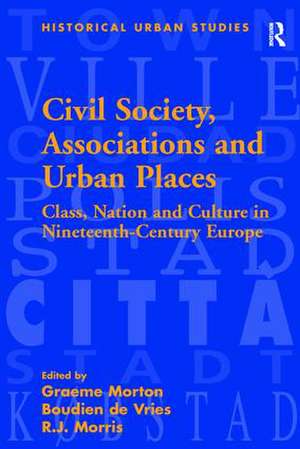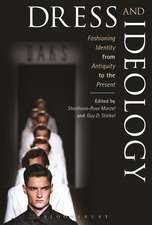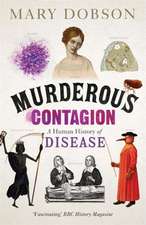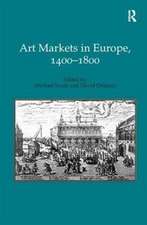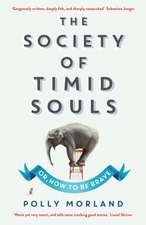Civil Society, Associations and Urban Places: Class, Nation and Culture in Nineteenth-Century Europe: Historical Urban Studies Series
Autor Boudien de Vries Editat de Graeme Mortonen Limba Engleză Paperback – 30 noi 2016
| Toate formatele și edițiile | Preț | Express |
|---|---|---|
| Paperback (1) | 338.33 lei 6-8 săpt. | |
| Taylor & Francis – 30 noi 2016 | 338.33 lei 6-8 săpt. | |
| Hardback (1) | 822.54 lei 6-8 săpt. | |
| Taylor & Francis – 28 iul 2006 | 822.54 lei 6-8 săpt. |
Preț: 338.33 lei
Preț vechi: 386.77 lei
-13% Nou
Puncte Express: 507
Preț estimativ în valută:
64.74€ • 67.77$ • 53.57£
64.74€ • 67.77$ • 53.57£
Carte tipărită la comandă
Livrare economică 05-19 aprilie
Preluare comenzi: 021 569.72.76
Specificații
ISBN-13: 9781138277755
ISBN-10: 1138277754
Pagini: 240
Dimensiuni: 156 x 234 x 27 mm
Greutate: 0.45 kg
Ediția:1
Editura: Taylor & Francis
Colecția Routledge
Seria Historical Urban Studies Series
Locul publicării:Oxford, United Kingdom
ISBN-10: 1138277754
Pagini: 240
Dimensiuni: 156 x 234 x 27 mm
Greutate: 0.45 kg
Ediția:1
Editura: Taylor & Francis
Colecția Routledge
Seria Historical Urban Studies Series
Locul publicării:Oxford, United Kingdom
Cuprins
Contents: Introduction: Civil society, associations and urban places: class, nation and culture in 19th-century Europe, R.J. Morris; Institution-building and class formation: how 19th-century bourgeois organized, Sven Beckert; Voluntary societies and urban elites in 19th-century Naples, Daniela Luigia Caglioti; The instrumentalization of bürgerlichkeit: associations and the middle class in Hallein, Austria from the 19th to the beginning of the 20th century, Ewald Hiebl; Middle-class identity or identities in a multi-ethnic city: associations in Bratislava in the 19th century, Elena Mannová; Internationalist networking in a multinational setting: social democratic cultural associations in Austro-Hungarian Trieste, 1900-14, Sabine Rutar; Voluntary societies in the Netherlands, 1750-1900, Boudien de Vries; In good company: class, gender and politics in The Hague's gentlemen's clubs, 1750-1900, Jan Hein Furnée; Urban associations in England and Scotland, 1750-1914: the formation of the middle class or the formation of a civil society?, R.J. Morris; The temperance movement and the urban associational ideal: Scotland, 1820s to 1840s, Irene Maver; Bourgeois citizenship and the practice of association in post-revolutionary France, Carol Harrison; Index.
Notă biografică
Graeme Morton is Scottish Studies Foundation Chair and Professor of History at the University of Guelph, Canada. Boudien de Vries is Associate Professor of Social History in the Department of History at the University of Amsterdam, The Netherlands. Robert J. Morris is Professor of Economic and Social History at the University of Edinburgh, UK.
Recenzii
’...Morton et al. have compiled a praiseworthy composition concerning human liaisons within towns and cities... Skilfully weaving together the numerous threads that help shape societies and their cultural environments, the authors should be commended for their blending a plethora of civil associations and cultural values in order to explain the connections between societies, associations and urban settlements.’ Australian Economic History Review
Descriere
Civil society has become central to the historian's understanding of class, cultural and political power in the nineteenth century town and city. This volume brings together essays by an international group of urban historians who examine the construction of civil society from associational activity in the urban place. The volume shows that a deep and interlocking civil society does not automatically lead to a rise in democratic activity.
